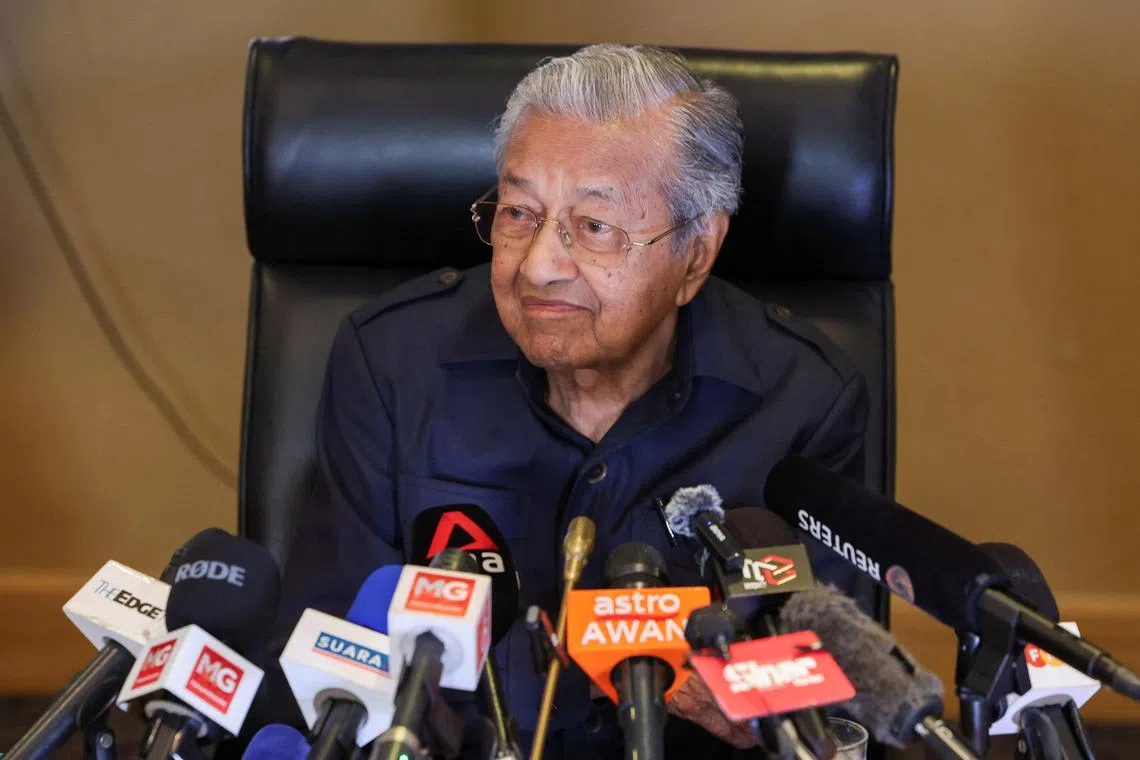Treachery claims fly over Pedra Branca after Malaysian royal panel calls for probe into Mahathir
Sign up now: Get ST's newsletters delivered to your inbox

The report of a royal inquiry made public on Dec 5 pointed to a failure to defend Malaysia’s sovereignty under the Mahathir administration.
PHOTO: REUTERS
Follow topic:
KUALA LUMPUR – Accusations of treachery are flying between Tun Dr Mahathir Mohamad and his former Pakatan Harapan (PH) colleagues over Malaysia’s 2018 decision to drop a challenge over the award of Pedra Branca to Singapore.
Prime Minister Anwar Ibrahim started the ball rolling, stating that the report of a royal inquiry made public on Dec 5
A Royal Commission of Inquiry (RCI) set up in February by Mr Anwar had suggested that “criminal investigations can begin against Dr Mahathir for an offence under Section 415(b) of the Penal Code and punishable under Section 417 and 418 of the same code”. The Penal Code sections cited refer to cheating offences with a maximum jail term of seven years.
But Dr Mahathir – Mr Anwar’s mentor-turned-nemesis – then questioned if his then Deputy Prime Minister Wan Azizah Wan Ismail, who is Mr Anwar’s wife, was also guilty of treachery, as the decision was ratified by Cabinet on May 23, 2018.
“The Prime Minister recently said this was an issue of betrayal. If so, why from May 2018 to February 2020 did Wan Azizah not speak about this ‘betrayal’?” he asked in a Dec 10 statement. February 2020 saw the fall of the PH coalition government and the resignation of then Prime Minister Mahathir after 22 months in power.
However, Datuk Seri Wan Azizah and the party chiefs of PH components Parti Amanah Negara and Democratic Action Party (DAP) have insisted that the Cabinet was merely informed about Dr Mahathir’s decision made on May 21, 2018, “without referring to the Cabinet”, to discontinue the applications to the International Court of Justice (ICJ) for review and interpretation of its 2008 finding.
“Only two days later, after the decision was made, did Dr Mahathir inform the ministers at a Cabinet meeting,” said a Dec 12 joint statement by Dr Wan Azizah, Amanah president Mohamad Sabu and DAP secretary-general Anthony Loke, who were all members of the Mahathir Cabinet.
“It was only to inform under ‘other matters’ on the agenda, and not for discussion to reach a decision. As a statesman, we believe Dr Mahathir should take full responsibility and not lay it on the shoulders of those who were not involved,” they added.
Dr Mahathir, via a statement issued by his lawyer, shot back on Dec 12 that it did not matter if an issue was “raised, informed or surfaced” in a Cabinet meeting as any opinion “that needs to be expressed must be made during the meeting”. He added that in his memory, it was “minuted that all members, including the trio, agreed with my view/information”.
“The issue of whether I take responsibility on this issue does not arise as I was head of government at the time. The question is whether they will take up collective responsibility as Cabinet members,” he said.
The ICJ at the Hague in 2008 handed to Singapore the sovereignty of Pedra Branca, which Malaysia calls Batu Puteh, after both countries took the territorial dispute to the court. The ICJ also announced its decision on two other maritime features in the area. It said Middle Rocks (Batuan Tengah) belonged to Malaysia, and sovereignty over South Ledge (Tubir Selatan) will belong to the state in the territorial waters in which it is located.
Both countries said in 2008 that they would accept and abide by the court’s decision, which is final.
But Malaysia in 2017, under then Premier Najib Razak, started an application for revision of the ICJ’s 2008 decision, citing new evidence that it had. A hearing was subsequently set for June 2018. However, Dr Mahathir, upon becoming prime minister in May 2018, decided to abandon the proceedings.
The loss of Batu Puteh has continued to be a highly politicised issue in Malaysia. The RCI report was debated by Parliament on Dec 12 under a government motion to “effectively implement the main recommendations”, which include the criminal probe against Dr Mahathir. However, a vote to pass the motion was not taken, and deferred to the next parliamentary session, next year.
Malaysia’s King, Sultan Ibrahim Iskandar of Johor, along with PM Anwar and leaders of Umno – which lost power in 2018 to the Mahathir-led opposition – have criticised Dr Mahathir over the decision not to pursue the Pedra Branca review.
Singapore’s Ministry of Foreign Affairs had in January 2024 said the RCI was “an internal matter of Malaysia”,
The ICJ’s decision can no longer be reviewed as the 10-year limit lapsed on May 23, 2018, the same day Malaysia’s Cabinet decided not to pursue the matter further.
The declassified 238-page report by the RCI said Dr Mahathir had written to then Solicitor-General Engku Nor Faizah Engku Atek on May 21, 2018, that “after studying suggestions of the interpretation of (the ICJ case), I am of the view that this effort need not be continued”.
Dr Mahathir had insisted in his June 2024 testimony to the RCI that his letter to the solicitor-general was “not a decision... but only an opinion”. However, the royal panel found that Datuk Engku Nor Faizah “understood the letter as... instructions from Dr Mahathir to discontinue both applications”.
The RCI also pointed out that she wrote to Singapore that Malaysia would not be proceeding with the two ICJ applications


